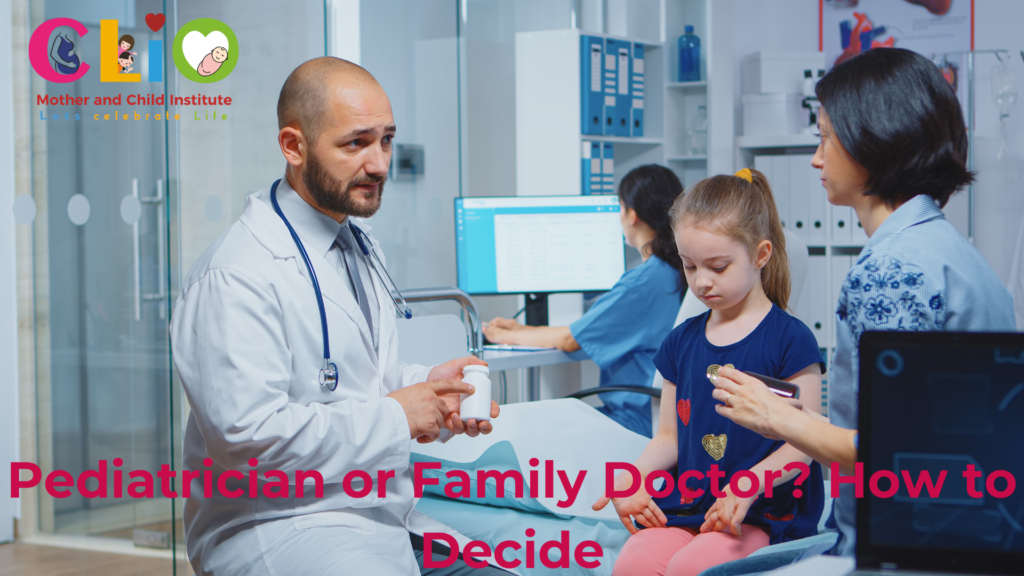When it comes to your child’s healthcare, making the right choice in selecting a doctor is essential. At some point, many families find themselves at a crossroads: should they opt for a family physician who treats patients of all ages, or should they go for a dedicated pediatrician doctor for their little one? Both options have their merits, but it’s important to understand the key distinctions before making a decision. Let’s explore the differences and why a pediatrician might be the best choice for your child’s healthcare needs.
What is the difference between a pediatrician and a family doctor?
Pediatricians and family doctors are both highly trained medical professionals, but they specialize in different areas of healthcare. These distinctions encompass their education, training, specialties, and patient demographics. Let’s delve into what sets these medical professionals apart to help you make an informed choice for your family’s healthcare needs.
Pediatricians:
Pediatricians are medical experts who focus exclusively on the health and well-being of children, from birth until they reach the age of 18. They have a deep understanding of children’s physical, mental, and behavioral health.
Pediatrician doctors typically conduct multiple check-ups for children each year until the age of two. Afterward, they continue to provide annual physicals and address illness-related visits, unless more frequent care is necessary due to specific health needs. This specialization means they are uniquely equipped to address the specific needs and challenges that arise during a child’s development.
Family Doctors:
On the other hand, family doctors are medical practitioners who provide care to patients of all ages, from infants to seniors. They offer comprehensive healthcare services for the entire family, making them a convenient choice for households looking for a single healthcare provider. Family doctors are required to periodically retake the board certification exam to ensure their continued competence in providing top-tier medical care.
Is it better to have a family doctor or pediatrician near me?
The choice between a pediatrician and a family doctor hinges on your specific circumstances.
Pediatricians undergo specialized training to provide expert care to children and possess extensive experience in diagnosing and treating a wide range of common symptoms and conditions that occur during infancy, childhood, and adolescence. Furthermore, pediatricians are well-versed in child development stages, enabling them to identify signs of developmental disorders in young children.
Their ability to provide care and foster relationships with young patients is beneficial not only for the children but also for their parents, enhancing the overall healthcare experience. This approach ensures that children can receive necessary care without fear of visiting the doctor. In many pediatric practices, the environment is intentionally designed with children in mind, featuring toys, books, and activities to create a more enjoyable overall experience.
Furthermore, numerous pediatric doctors actively assist parents in caring for their children at home by imparting valuable insights about their child’s health and any potential conditions. Recognizing that infancy and childhood can pose unique challenges for parents, many pediatricians go the extra mile by addressing questions and offering after-hours contact information to provide ongoing support and peace of mind.
An essential factor to weigh when deciding between a pediatrician and a family doctor is whether your child requires specialized care. If your child was born prematurely, has a birth defect, or faces any other specific health challenge, opting for a pediatrician might be the preferable choice. Certain infants and children necessitate the expertise of a pediatrician who specializes in a particular facet of children’s health. Family doctors typically allocate around 10% of their time to pediatric care, potentially resulting in a lesser degree of experience compared to pediatricians in managing childhood ailments.
At what point should you transition from a pediatrician to a family doctor for your child?
There isn’t a specific age at which your child must stop seeing their pediatrician; nevertheless, pediatricians typically provide care for children until they reach the age of 18. When your child enters middle school, it becomes crucial to initiate a discussion about the impending transition to a family doctor.
Around the age of 11, children often start feeling mature enough to forego visits to the pediatrician’s office, making it an opportune moment to introduce them to a family doctor. It’s worth noting that parents retain the responsibility of making healthcare decisions for their children until they reach legal adulthood.
The choice to switch from one doctor to another is also contingent on the child’s specific health requirements and comfort level with the healthcare provider.
CALL US TODAY!
At CLIO Mother and Child Institute, our pediatric services encompass a wide range of offerings, including newborn check-ups, vaccinations, prenatal consultations for expecting mothers, and the convenience of same-day appointments. We provide comprehensive care for various childhood illnesses, including but not limited to pneumonia, ear infections, UTIs, asthma exacerbations, tonsillitis, upper respiratory infections, and influenza, as well as the management of sprains, strains, and fractures.
If you’re in search of a highly qualified pediatrician with extensive experience in the field, we invite you to consider CLIO Mother and Child Institute as your healthcare destination. Our team is committed to delivering the highest standard of care and is dedicated to enhancing the quality of life for each patient. Whether you have questions or require an appointment for your baby, please don’t hesitate to reach out to us at 100 or simply submit your inquiry using our convenient online form. Your child’s health and well-being are our top priorities, and we look forward to serving you.


